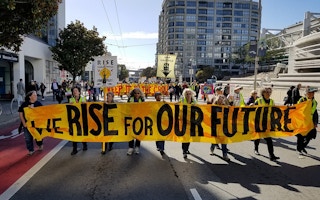Opening with a rendition of Michael Jackson’s Earth Song, attended by mayors, CEOs, and celebrities, and ending with Governor Jerry Brown’s announcement of a new satellite to monitor pollution levels, the Global Climate Action Summit in San Francisco was no ordinary environmental conference.
Organised to “take ambition to the next level”, politicians, business leaders and NGOs raced to announce a dizzying flurry of new commitments, new targets and new partnerships for climate action.
But as the dust settles, I took three lasting impressions away from the summit.
The first is the sense of sheer urgency conveyed by many speakers at the event, which took place against the terrifying backdrop of the arrival of Hurricane Florence.
“
We cannot afford piecemeal, incremental targets for action but must be bold enough to envision a prosperous, zero carbon future and set out with the resolve to get there as quickly as possible.
There could have been no starker confirmation that not only is climate change real, but it is already beating down American doors and flooding American homes.
Alongside other examples of extreme weather events elsewhere around the world, there was a tangible sense in the room that this is no abstract issue.
It was a reminder that we cannot afford piecemeal, incremental targets for action but must be bold enough to envision a prosperous, zero carbon future and set out with the resolve to get there as quickly as possible.
Many business leaders are aiming for net zero carbon emissions by 2050, for example, and are treating it less as a target and more of a deadline. They know emissions need to fall dramatically in the first half of the century if we have any hope of transforming the economy to deliver on the Paris Agreement.
It was credit to Governor Jerry Brown that speakers ranged from the CEO of energy company EDF, Jean-Bernard Levy, to Harrison Ford in his capacity as a board member to Conservation International, to Tuntiak Katan from the Confederation of Indigenous Nationalities of the Ecuadorian Amazon.
The speakers and the audience reflected the passion and commitment of a global community that is resolved to act on climate change. And while there was agreement on the need to act, and recognition of the fact that we are all dependent on the same planet and its resources, there was still significant disagreement and difference in emphasis from different groups. This produced a dynamic, wide-ranging discussion.
Finally, at a time when political leadership on climate issues can be found wavering, the scale of the event added new energy to the momentum for climate action.
The global calendar is increasingly populated with climate events reflecting the growing movement to act. As Al Gore said at the summit, political will is also a renewable resource and this summit has given the climate dialogue fresh impetus.
What was unusual about the event was that it stepped away from the UN process and allowed non-state actors to demonstrate the concrete action that they are taking based on long-term strategic thinking.
Despite the wider context and the climate tragedy hitting the east coast and elsewhere, there was much to offer hope at the Global Climate Action Summit.
Businesses are acting on climate, and they are willing and ready to support governments deliver on long-term ambitious goals. Administrations come and go but civil society will go on, and we deserve a zero carbon future.
Eliot Whittington is director of the Prince of Wales’s Corporate Leaders Group at the University of Cambridge. This story was published with permission from Thomson Reuters Foundation, the charitable arm of Thomson Reuters, that covers humanitarian news, climate change, resilience, women’s rights, trafficking and property rights. Visit http://news.trust.org/











